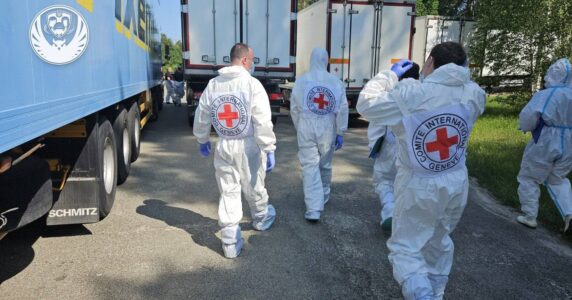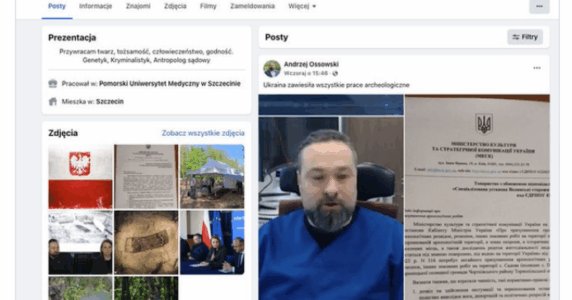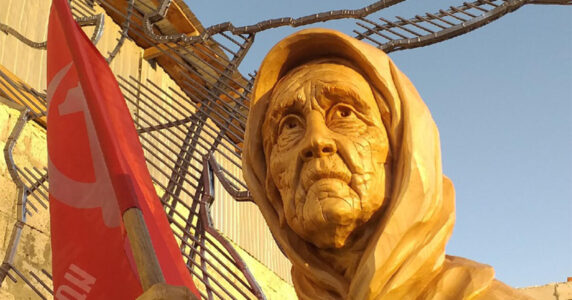Navigation and useful materials
The propaganda of the Russian schizofascist (as defined by the historian Timothy Snyder) regime continues its information attacks on Europe. First come the western neighbours of Ukraine, who know from their own bitter experience what Russia is.
Monitoring of Ukraine War Disinfo Working Group, which is at the disposal of the Centre for Strategic Communication, tracked the destructive ideas and narratives that Russia spread to neighbouring countries on September 5-11.
There were predominant messages that it was not really Russia that attacked Ukraine, but the US that was fighting Russia in Ukraine, that sanctions were affecting more the West and that “ordinary Europeans,” who were not taken care of by the elites and governments of these countries, would suffer from this energy crisis.
And, of course, pro-Russian websites or groups on social networks did not tell anything about the successful counterattack of Ukraine in Kharkiv region.
In this material, we will consider examples of how disinformation worked in the mentioned period in such countries as the Czech Republic, Lithuania, Poland, Romania, Slovakia, Belarus, and Bulgaria.
Czech Republic
In this country, propaganda media focused on spreading fakes about serious Ukrainian losses. This was the main response to the success of the Armed Forces. If the victories of Ukrainians were still mentioned, for example, the sinking of the cruiser “Moskva,” then Russian disinformation presented this as the covert actions of the United States.
Propaganda also cast theories that the Czech Republic and the Baltic States are the main countries that fuel the war. This narrative originated from a twisted interpretation of the words of French President Macron and was widely disseminated on disinformation platforms and on social networks.
The development of the topic of the energy crisis with reference to domestic policy, as well as anti-Russian sanctions, continued. We can assume that this trend will continue.
A new narrative has emerged, justifying Russia’s attack on Ukraine. Disinformers appeal to the UN Charter, which allegedly gave Russia the right to attack any state if there were “fascists” there.
A conspiracy narrative was also detected in the Czech Republic. Such crimes are periodically multiplied by propaganda to hide Russia’s crimes behind the information noise. According to the new “fairy tale,” the entire leadership of NATO was dismissed and replaced by the Order of Malta. This is part of a broader Kremlin approach to demonizing the West and presenting NATO almost as a satanic organization. Let us remind you that Russian propaganda already spread conspiracy in the Czech Republic that the pharmaceutical mafia was behind the war and COVID. Another of the narratives, which was previously recorded, in particular in Ukraine and Poland, says that the war is a consequence of Israel’s implementation of the “New Jerusalem” project for the colonization of the south of Ukraine and the organization of a new state formation here.
Lithuania
Disinformation messages were mostly aimed at undermining public confidence in the Lithuanian government and also, tellingly, the key media.
It should be noted that discrediting respective media is a tool that helps the Kremlin undermine democracy from within. After all, when there is no moral authority, the idea is spread among people that “no one can be believed, everyone lies, especially the media,” and it is easier to promote a disinformation narrative, about the conspiracy of “criminal elite, government, the global backstage” and to succumb to the deception that only alternative media (which are actually created by the Kremlin) tell the truth.
In Lithuania, the following “ideas” were disseminated: all the media are lying, the authorities are using the war in Ukraine to establish a dictatorship, Ukraine is corrupt, the Lithuanian authorities are supporting Ukrainians, while Lithuanian citizens live impoverished lives.
At the time of the Ukrainian counterattack, propaganda was writing about Zaporizhzhia NPP. It also accused the West of using Ukraine to wage war with Russia.
The panic spread that the situation in the energy market, namely electricity tariffs, was catastrophic. It was said to be a consequence of the government’s policy. The nationalist political party “Nacionalinis susivienijimas” highlighted this topic by holding a protest against the “destruction of the state energy sector.”
Poland
Russian propaganda has traditionally tried to pit Poland and Ukraine against each other, to incite Poles and Ukrainians, in particular, around the topic of the UIA (UPA). The narrative itself was relatively new and unexpected, namely, the accusation by the Polish authorities that they seemed to “sympathize/acknowledge the UPA.” This message was disseminated by right-wing and pro-Kremlin groups. The main figure behind this, Grzegorz Braun, is the face of the STOP Ukrainization of Poland campaign.
Stories that discredit migrants from Ukraine remain among the main narratives of the Kremlin in Poland.
For example, one of the materials tells that city law enforcement officers detained an aggressive and dangerous Ukrainian. Or that Ukrainian Romani demand social assistance in Poland, with which they then return to Ukraine.
In one of the articles, a shocking conspiracy narrative spread that Ukrainian terrorists and teachers conspired to use children abroad for trafficking in organs.
Pro-Russian platforms also distributed various videos aimed at discrediting Ukrainians, in particular: a song that ridiculed fundraising for a drone for the Ukrainian army, a video with a Roma pogrom that was supposed to testify that Ukrainians were Nazis, as well as a video in which the supposedly Ukrainian military displayed Nazi symbols.
The message that some business circles in Ukraine make money from the war was also promoted, and that is why the war is still going on.
Romania
In Romania, there was a traditional promotion of messages against the West and against anti-Russian sanctions. As is often the case, the Russians project their crimes on the United States. The war in Ukraine is said to be a continuation of American imperialism and the genocides it committed in Yugoslavia and Syria. Messages spread that it was the West that was waging war with Russia, and that Russia had lost nothing, while the West was on the verge of defeat.
Even during the Ukrainian counteroffensive, propaganda claimed that Russia would win the war.
Anti-Russian economic sanctions were manipulatively called counterproductive. At the same time, it was asserted that it was the US that forced the EU countries to impose sanctions and that Europeans did not seem to share this policy. The message was spreading, supposedly Eurasian leaders are more sensitive to public opinion, in contrast to the so-called “democratic West.”
One news piece manipulatively claimed that three US companies owned 28% of Ukraine’s arable land. This is a repetition of the narrative that was prevalent in Romania during its accession to the EU, stating that most of the assets in the country would belong to foreigners.
Slovakia
Recently, as the country’s political balance has become increasingly fragile, disinformation continues to attack the government in the context of the war, accusing it of being under US control. Anti-Americanism goes alongside Euroscepticism. It is asserted that the West and the US waging this war in Ukraine are not ready for peace talks.
The “energy crisis” and other “negative side effects” of anti-Russian sanctions remain the focus of attention. There are loud messages like: “government policy makes us all freeze” or “sanctions make Russia stronger and us — weaker.”
Belarus
Pro-Russian resources in Belarus wrote that Poland was preparing to carry out offensive military actions in the Belarusian direction.
This week, the discourse of pro-Kremlin monitoring media in Belarus was dominated by an economic topic. Propagandists focused on the supposedly disastrously devastating effects of sanctions on the European economy, the fact that Western citizens did not support sanctions against Russia, and emphasized protests in Europe — in the Czech Republic, France, and Germany.
Bulgaria
Russian propaganda, as always, resorted to anti-Western and anti-American rhetoric. Once again, a narrative about US bio-laboratories emerged that seem to be experimenting with cholera and plague. Other points: Russia “liberated” Donbas and Crimea, Ukraine has no chance of returning Crimea or even regaining control over Enerhodar in Zaporizhzhia Oblast, and the EU, in fact, is a failed project.
In one of the materials, the author states that the IAEA insulted Zelenskyy twice and therefore the new tactic of Kyiv is to make schools and teachers… targets of the military. Such a strange logic to show the Ukrainians as terrorists, absolving the real criminals.
In Bulgaria, the pro-Kremlin media also spread a narrative about “terrible” Ukrainian refugees. The author of the material claimed that a Bulgarian rescuer died trying to save two Ukrainian women who were allegedly under the influence of drugs and alcohol, and who had already been rescued several times before.
As the elections approached, criticism of the EU and the policies of the current government sharply escalated. “The EU is weak and will soon disintegrate,” claims the propaganda narrative, speculating on the problem of the slow nature of procedures and agreements in this organization. As in other countries, it was about energy topics and that Europe would freeze without Russia.
Thus, as we can see, Kremlin propaganda continues to try to shift responsibility to the United States for its criminal war. It also attempts to scare people with the cold winter and undermine confidence in the governments that help Ukraine in order to influence their change. At the same time, not only governments, but also the media are discredited to bring chaos to society. Discrediting Ukrainians in everyday life and trying to convince the audience that Ukraine will not be able to win the war remain constant tasks of the Russians.
Центр стратегічних комунікацій та інформаційної безпеки
The media version of the article is available on the Channel 24 website
If you have found a spelling error, please, notify us by selecting that text and pressing Ctrl+Enter.


